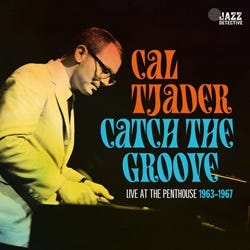Cal Tjader - Catching The Groove: Live At The Penthouse 1963-1967
(Jazz Detective, 2023)
Cal Tjader’s professional arc passed through the bands of Dave Brubeck, Vince Guaraldi, Alvino Rey, George Shearing, and Brew Moore, through his own bands and his specialization in Latin Jazz. With his band, Tjader recorded with Stan Getz, Mary Stallings, Anita O’Day and Eddie Palmieri. He recorded for Fantasy Records in the 1950s, finding his way to Verve in the 1960, when the performances collected on Catching The Groove: Live At The Penthouse 1963-1967 occurred.
Discovered and curated by Zev Feldman, Catching The Groove was assembled from six dates at Seattle’s Penthouse jazz club during his annual residencies between 1962 and 1967. Tjader was a vibraphonist who played in the shadows of Lionel Hampton, Milt Jackson, Red Norvo, and Bobby Hutcherson because he and his bands typically recorded and toured on the west side of the Rocky Mountains. This allowed Tjader to incubate with the music being made by Machito, Chico O’Farrill, Mongo Santamaria and Tito Puente.
Soon Tjader, the son of Swedish-American vaudevillians, became one of the most successful non-Latino Latin musicians and was well regarded by all, regardless of nationality. The mid-1960s found Tjader making his most compelling and provocative recordings for Verve, including, Soña Libré (1963), Soul Sauce (1964), El Sonido Nuevo, with Eddie Palmieri (1966) and Along Comes Cal (1967).
The selections comprising Catching The Groove are made up of equal parts mainstream and Latin jazz, in quantities demonstrating Tjader’s command of both genres. Strayhorn’s “Take The ‘A’ Train” stands up well with Jobim’s “Manha De Carnaval” with pianist Clair Fischer and percussionist Bill Fitch as does “On Green Dolphin Street” and “Maramoor Mambo” with Lonnie Hewitt and Armando Pereza.
Tjader’s performances on June 9, 1966 with pianist Al Lulica, bassist Monk Montgomery, and Drummer Carl Burnett are as characteristic as they are refined. His gentle reading of Milt Jackson’s “Bag’s Groove” melts into Clair Fisher’s “Morning” before coming to a rolling boil on “Mambo Inn.” Cal Tjader deserves better exposure with his popularity having dimmed over the 40 years since his death. Catching The Groove goes a long way in helping the vibraphonist's reputation catch up.



